Every ecommerce website owner wants to increase traffic and sales, and this is possible when users can easily search for and find products they’re looking for. On the flip side, if you don't have a good search engine on your ecommerce store, you'll miss out on sales and visitors because nobody likes to take ages trying to find something.
Using search engines in your ecommerce website has many advantages. Most search tools come with features like autocomplete, faceted search, search analytics, and support to help boost the user search experience.
This article will explain the benefits of using search engines in online stores and introduce you to the top 5 search engines that you can use.
What is Medusa? Medusa is a Node.js-based, open source, composable commerce engine. It is built on abstract layers to allow developers to fully customize the engine and integrate third-party services and tools such as search engines without hacky workarounds.
Why Use Search Engines in Ecommerce Websites?
To avoid losing a significant amount of revenue and customers, ecommerce websites must organize quality ecommerce site searches. Here are some advantages of integrating a search engine into your ecommerce website:
Increase Sales and Revenue: Customers can quickly find the products they are looking for using a search engine, leading to increased conversions and sales.
Analyze Users’ Search Data: You will be able to analyze what your users liked and purchased. The analysis allows you to track your users and determine how to serve them better.
Control Traffic on Your Ecommerce Website: Search engines can help control traffic on ecommerce websites by providing users with fast and relevant results for their search queries. Having a good search engine can reduce the number of backend queries, which could avoid a surge in website traffic during high-traffic periods like Black Friday.
5 Ecommerce Search Engines for Developers
Meilisearch
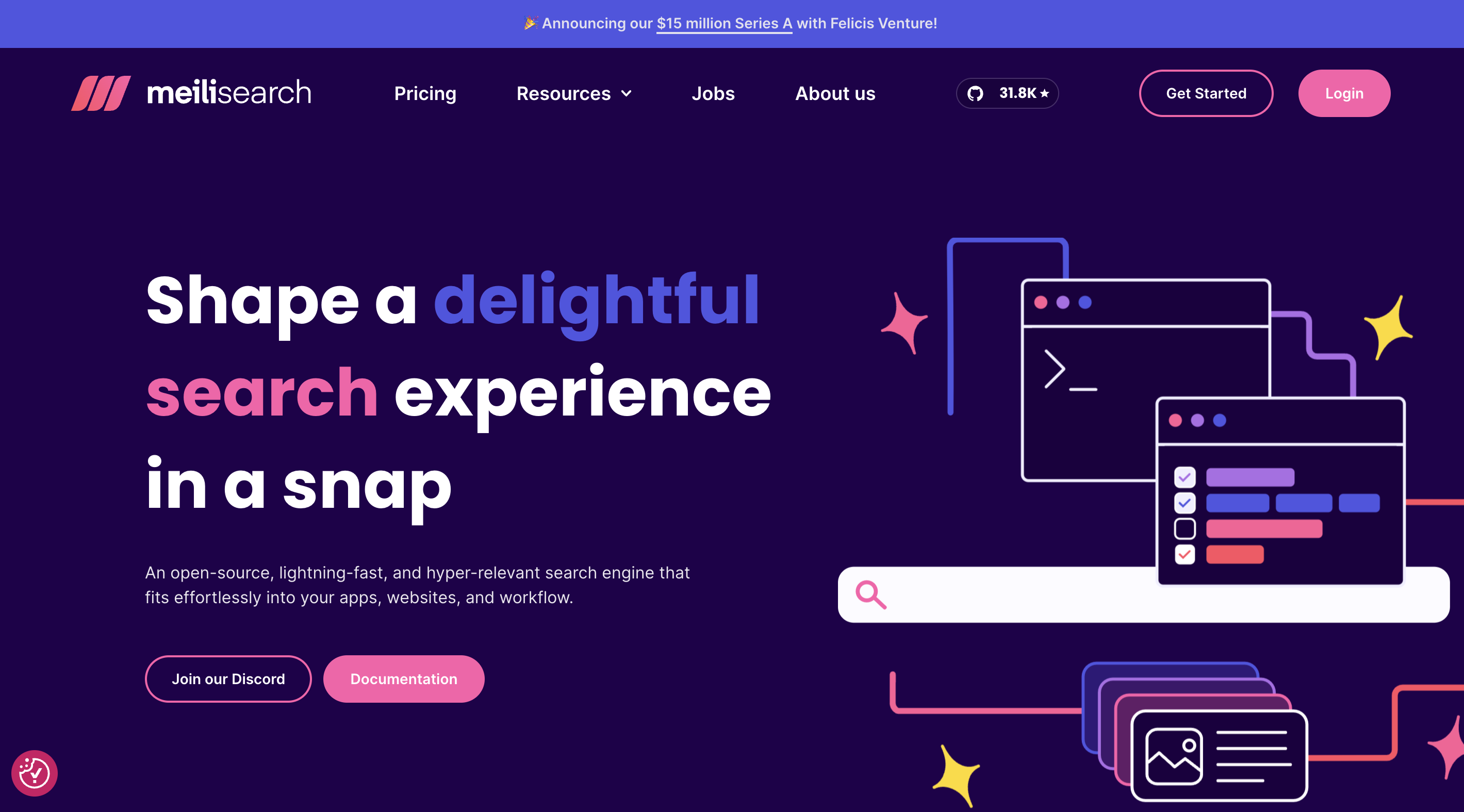
Meilisearch is a free and open source search engine that can provides advanced search features such as faceted search, full-text search, and typo tolerance. It can handle large data and provide a quick search experience.
By incorporating Meilisearch into an ecommerce website, users can find the information they need quickly, improving the overall user experience. MeiliSearch can also be used to analyze and visualize data, making it a valuable tool for businesses and organizations seeking to gain insights from their data.
Meilisearch is also known for its ease of integration and lightweight nature, making it simple to use and scale.
Unique Features of Meilisearch
Meilisearch is a lightweight and user-friendly search engine.
It is written in Rust and simple to incorporate into any project.
Meilisearch's ability to perform real-time indexing and searching enables fast search results even with large amounts of data.
It provides a simple and intuitive API, making it simple to customize and extend the search engine's functionality.
Meilisearch also has advanced features like ranking algorithms and typo tolerance that other search engines do not always have.
Learn how to integrate MeiliSearch with Medusa by following this documentation.
Algolia
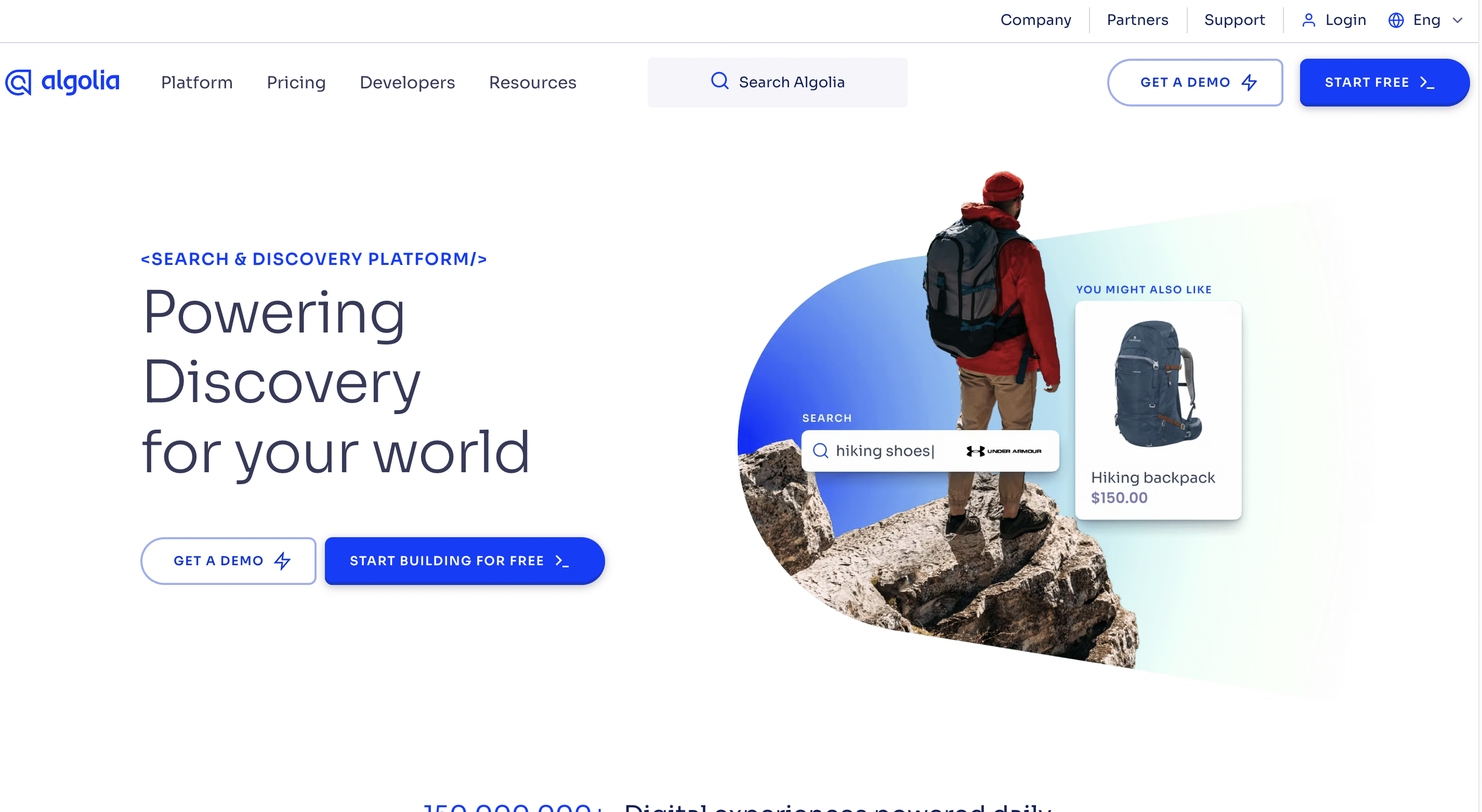
Algolia is a search-as-a-service platform that can be integrated with a website to provide advanced functionality such as instant search, typo tolerance, and faceted search. Even with large data, Algolia's powerful search algorithms can return results quickly and accurately.
By incorporating Algolia into a website, users can find the information they need more quickly, improving the overall user experience.
Additionally, Algolia provides several analytics and monitoring tools to gain knowledge about how people use the search feature and make decisions based on data to make the search experience better. Algolia also provides a simple SaaS solution to set up and scale.
Unique Features of Algolia
Algolia is a search engine for developers that provides quick and relevant search results for web and mobile applications. Some key features that distinguish Algolia from other search engines are as follows:
Algolia is designed for speed, with a distributed architecture that allows for quick search results even when dealing with large data.
Algolia allows developers to create custom ranking algorithms to control the relevance of search results based on their specific use cases. The "search as you type" feature of Algolia provides fast, accurate results as soon as the user starts typing.
Algolia's relevance tuning feature allows developers to fine-tune the relevance of search results by adjusting the weight of various attributes and facets.
Algolia comes equipped with multi-language support, making it easy to develop search experiences for a worldwide audience.
Algolia offers a hosted and managed service, so developers don't have to worry about managing infrastructure or scaling the service as their application grows.
Learn how to integrate Algolia with Medusa by following this documentation.
Typesense
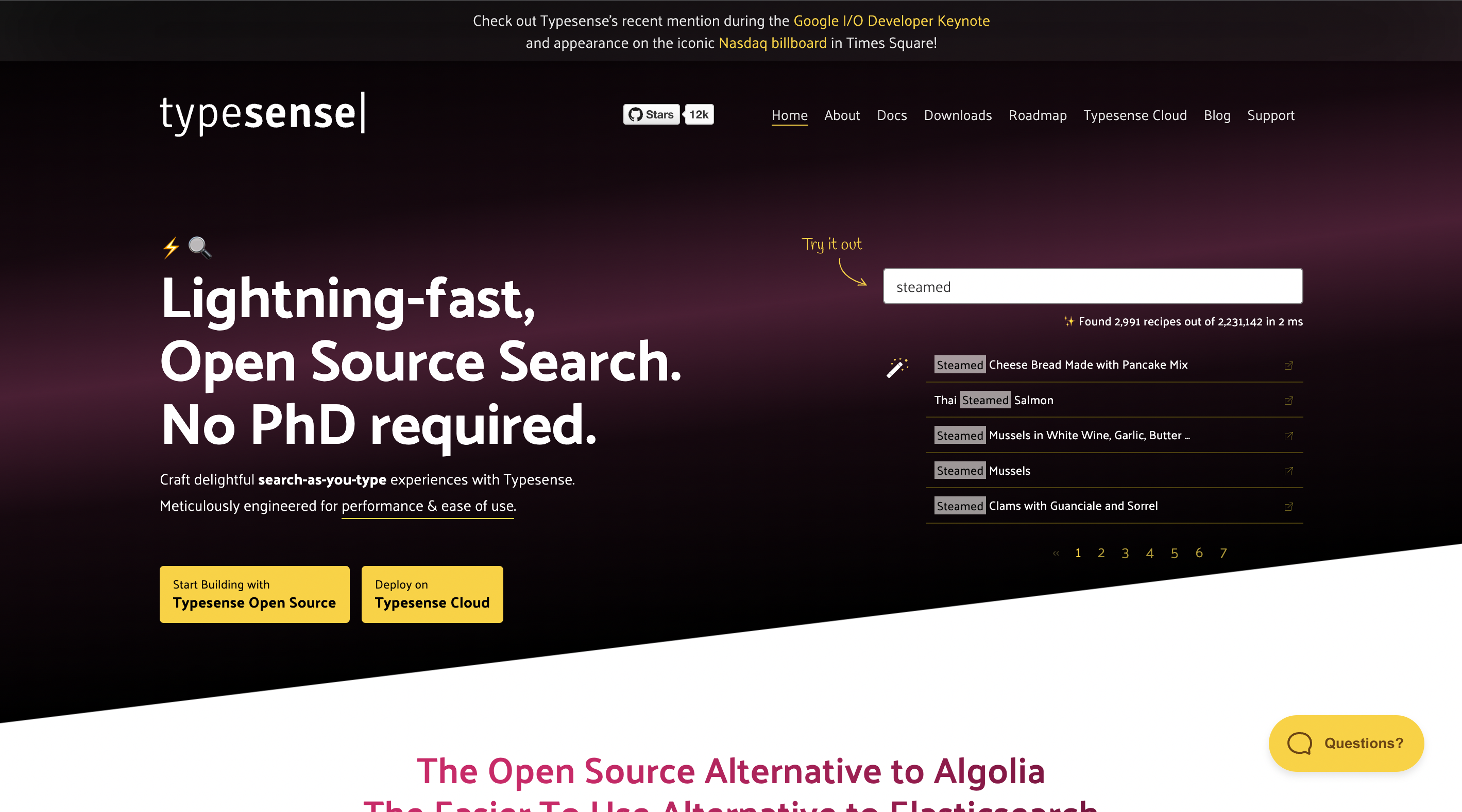
Typesense is a search engine that offers advanced search capabilities like instant search, typo tolerance, and faceted search when integrated into a website. Typesense's search algorithms are designed to produce fast, accurate results, even when dealing with large amounts of data.
Typesense's search algorithms are designed to produce fast, accurate results even when dealing with large amounts of data.
Additionally, Typesense has a fast response time, so search results are received quickly. It can also handle different languages and similar words easily, making it great for businesses and organizations to get information from their data. It is also known for its ease of integration and lightweight nature, making it simple to use.
Unique Features of Typesense
Typesense is a search engine that provides quick and relevant results for web and mobile applications. Among the key features that distinguish Typesense from other search engines are:
Typesense is engineered for quickness, featuring a distributed structure that allows for speedy search outcomes even with a substantial amount of information.
Typesense possesses advanced typo-tolerance capabilities, enabling users to receive relevant search results even when their query contains misspellings or typos.
Typesense allows developers to create custom ranking algorithms that control the relevance of search results based on their specific use case.
Typesense features integrated support for various languages, making it effortless to develop search experiences for a worldwide audience.
Typesense provides a simple and intuitive API, making it simple to customize and extend the search engine's functionality.
It is an open source search engine, that can be effortlessly customized and integrated into projects.
Sphinx
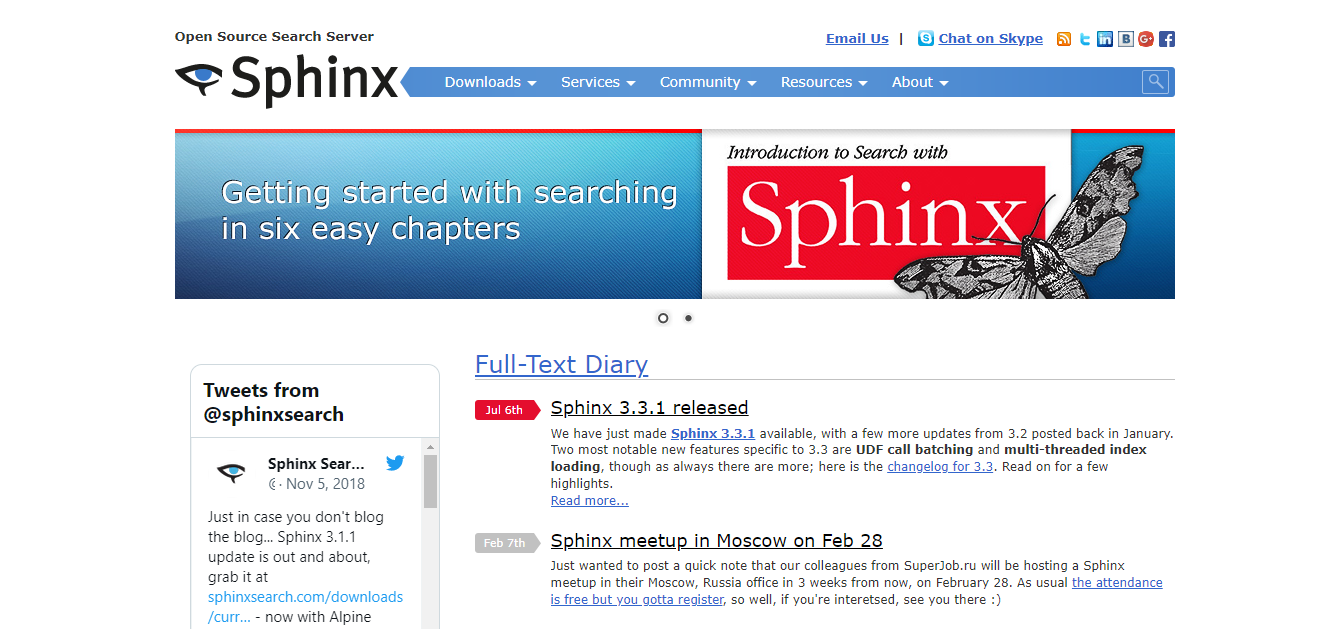
Sphinx is a search engine that can be integrated into a website to provide advanced search functionality such as full-text, Boolean, and faceted search. It is a powerful open-source search engine that can handle large amounts of data and quickly return results.
Furthermore, Sphinx allows you to customize the ranking algorithm and weighting system, which can help businesses and organizations improve the relevance of search results. Sphinx also supports multiple languages and can index and search across multiple data sources, making it a versatile tool for data search and analysis.
Unique Features of Sphinx
Sphinx is a full-text search engine that was specifically designed to handle large amounts of text data. It is frequently used for indexing and searching databases, emails, and other structured data. Some key features that distinguish Sphinx from other search engines are as follows:
Sphinx can handle large amounts of data and scale horizontally by distributing the index across multiple servers.
Sphinx is intended to be fast and efficient, with a small memory footprint and support for real-time indexing.
Sphinx provides developers with the ability to create custom indexing and ranking algorithms, as well as fine-tune the relevance of search results by adjusting the weight of various attributes and facets.
Sphinx includes built-in support for multiple languages, making it simple to create search experiences for a global audience.
Sphinx is an open source search engine that gives developers the ability to smoothly incorporate and adapt it into their ecommerce website.
Sphinx can index and search data from a variety of sources, including MySQL, PostgreSQL, XML, CSV, and JSON.
Elasticsearch
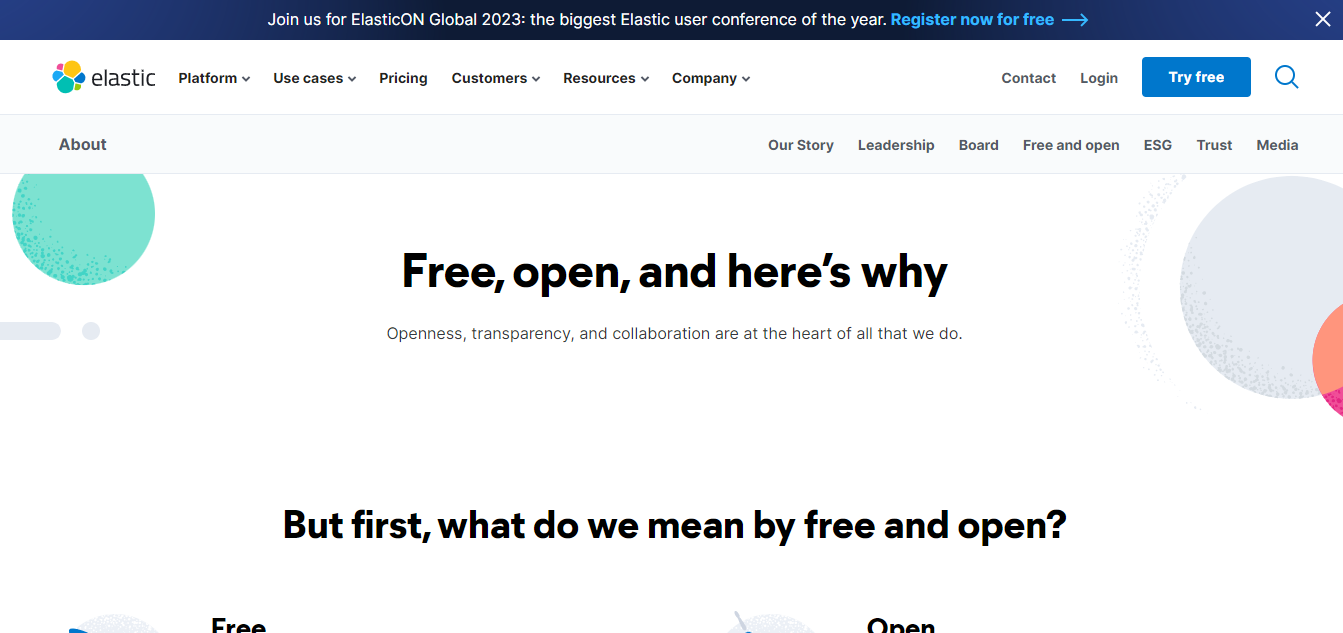
Elasticsearch is a search engine that can quickly and easily index and search large amounts of data. It can be integrated with a website to provide faceted search, full-text search, and geospatial search functionality.
Elasticsearch can also be used to analyze and visualize data, making it a valuable tool for businesses and organizations seeking to gain insights from their data.
Unique Features of Elasticsearch
Elasticsearch is a distributed search engine based on the Lucene library that is designed to handle large amounts of data while providing quick and relevant search results. Elasticsearch differs from other search engines in several ways, including:
Elasticsearch can handle large amounts of data and scale horizontally by distributing the index across multiple servers.
Elasticsearch is designed for speed and efficiency, boasting real-time indexing and search capabilities.
Elasticsearch's flexibility enables developers to create custom indexing and ranking algorithms, as well as finetune the relevance of search results by adjusting the weight of various attributes and facets.
Elasticsearch comes equipped with multi-language support, enabling the easy creation of search experiences for a worldwide audience.
Elasticsearch includes a robust set of analytics and visualization tools that make it simple to build custom dashboards and gain insight into search data.
Elasticsearch is versatile in that it can handle a wide range of use cases, including full-text search, analytics, logging, and more.
Elasticsearch is an open source search engine.
Conclusion
The importance of a search engine on your ecommerce website cannot be overstated because your users are extremely important. They should be able to find what they are looking for on your application quickly and easily, without having to search for hours.
This article introduced you to some fantastic search engines that you could integrate into your application. You can use any of them on your ecommerce website to provide your users with a consistent search experience.
Medusa is a good option for an ecommerce website because it offers an easy way to add search functionality using some of the options given in the article. With all of these in place, you can be confident of creating a fantastic application that your users will enjoy, driving sales, and optimizing your search.
Get started with Medusa by following the quickstart guide.
Should you have any issues or questions related to Medusa, then feel free to reach out to the Medusa team via Discord.
